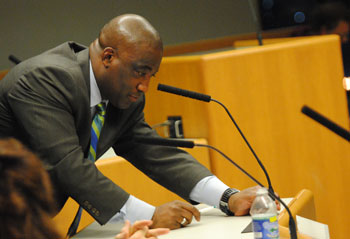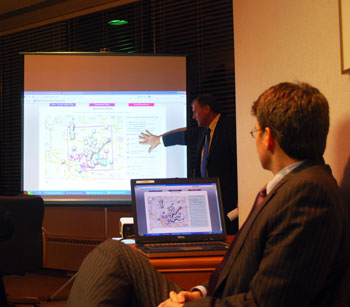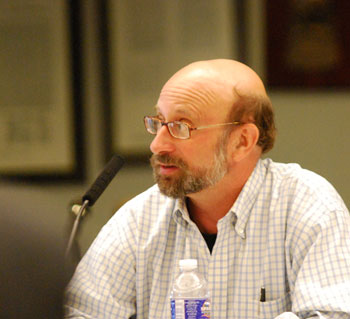Ann Arbor Transportation Authority board meeting (Oct. 20, 2011): Over the last two weeks, several significant developments in transportation planning have unfolded in and around Ann Arbor, not all of them at the most recent meeting of the AATA board.

AATA CEO Michael Ford adjusts the microphone for board member Charles Griffith at the board’s Oct. 20 meeting. (Photos by the writer.)
At an Oct. 10 Ann Arbor city council work session, the council received an update on the high capacity connector study for a geographic area that broadly connects the boomerang-shaped swath from Plymouth Road and US-23 down through Ann Arbor to South State Street.
Most significantly, the swath connects the University of Michigan’s north, central and medical campuses. The basic conclusion of that study was delivered to the AATA board several months ago: Sufficient ridership exists in the core of that area to support some kind of high-capacity “fixed guideway” system like Bus Rapid Transit (BRT), light rail, or elevated guideway.
What’s new are the steps that are now being taken to secure funding for the next phase of the connector study: An analysis that will yield the “preferred alternative.” That alternative will include selection of a specific transportation technology, as well as proposed routes and station locations.
Funding for part of that alternatives analysis was announced on Oct. 13 by the U.S. Dept. of Transportation – $1.2 million has been awarded to the AATA. However, that funding won’t cover the cost of the environmental study component of the project.
Related to that project, on Oct. 19 the Washtenaw Area Transportation Study (WATS) policy board voted to add the alternatives analysis to its Unified Planning Work Program. Next up will be formal action by the Southeast Michigan Council of Governments (SEMCOG) and the Michigan Dept. of Transportation that will facilitate funding applications to the Federal Highway Administration by the spring of 2012. Work on the study might begin before complete federal funding is in place.
The high-capacity connector study is taking place in the context of AATA’s countywide transportation master plan, which the board approved earlier this year, after more than a year of development. On Oct. 20, a day after the WATS policy board vote, the first meeting of a group was held that could become the board of a new countywide transportation authority. That new authority could be formed under Michigan’s Act 196 of 1986 – the current group is called the U196 board, short for “unincorporated Act 196.” Their first meeting was relatively informal, but members determined to schedule meetings for November and December instead of waiting until January 2012.
The following week, on Oct. 26, Gov. Rick Snyder gave a speech outlining key components of a sketch for improved transportation infrastructure in the state. The speech included a call for the formation of a regional transit authority in southeast Michigan that could include Wayne, Oakland, Macomb and Washtenaw counties.
Two days later, on Oct. 28, the content of the governor’s speech was part of the focus of conversation for a transportation financial planning group, led by former Washtenaw County administrator Bob Guenzel and McKinley Inc. CEO Albert Berriz. The group convened its second of four meetings that it expects to hold before the end of the year. In early 2012, the group is expected to deliver a white paper to the U196 board with recommendations on funding options for countywide transit.
At that meeting, the group heard from Dennis Schornack, a special advisor to Snyder on transportation. Schornack sketched out the contents of a still “somewhat secret” three-bill package that would establish a regional transit authority (RTA), including Wayne, Oakland, Macomb and Washtenaw counties. Reaction of the financial planning group to the RTA seemed sanguine. The idea of possibly funding transit through vehicle registration fees (enacted on an ad valorem basis), as an alternative to floating a countywide transit millage, appeared to be the most attractive aspect of the possible RTA.
Berriz concluded that Schornack’s presentation had thrown the group’s conversation into a state of flux.
Amid that activity, the AATA board did its part to keep the existing buses running, by convening its regular monthly meeting on Oct. 20. Of its action items, the most significant was a resolution authorizing its CEO to begin negotiations with Michigan Flyer to contract for bus service between downtown Ann Arbor and Detroit Metro airport.
Given the possibility that an RTA could be in Ann Arbor’s future, Schornack’s advice on the Detroit-Ann Arbor airport contract was this: Keep it short-term. [Full Story]







